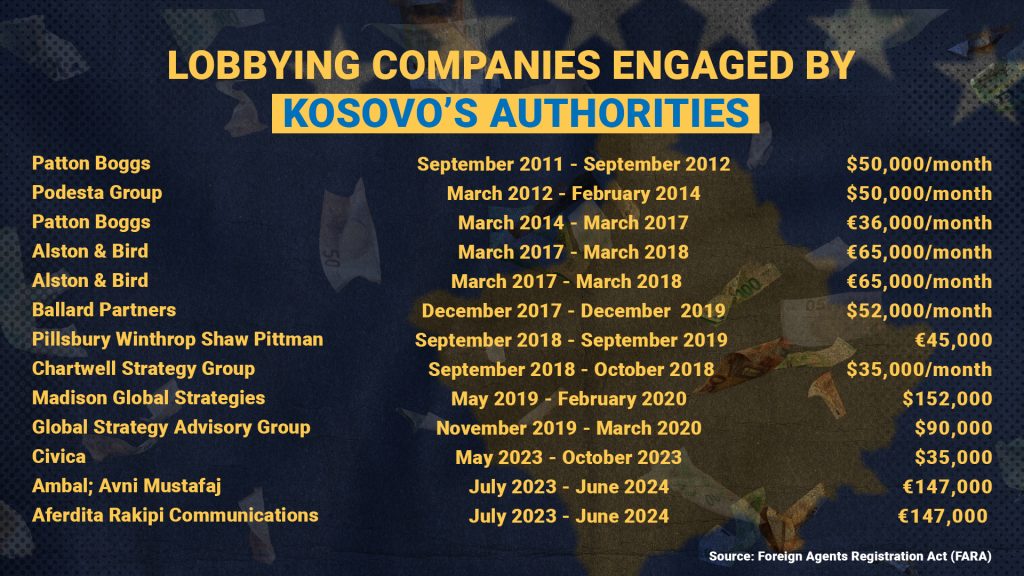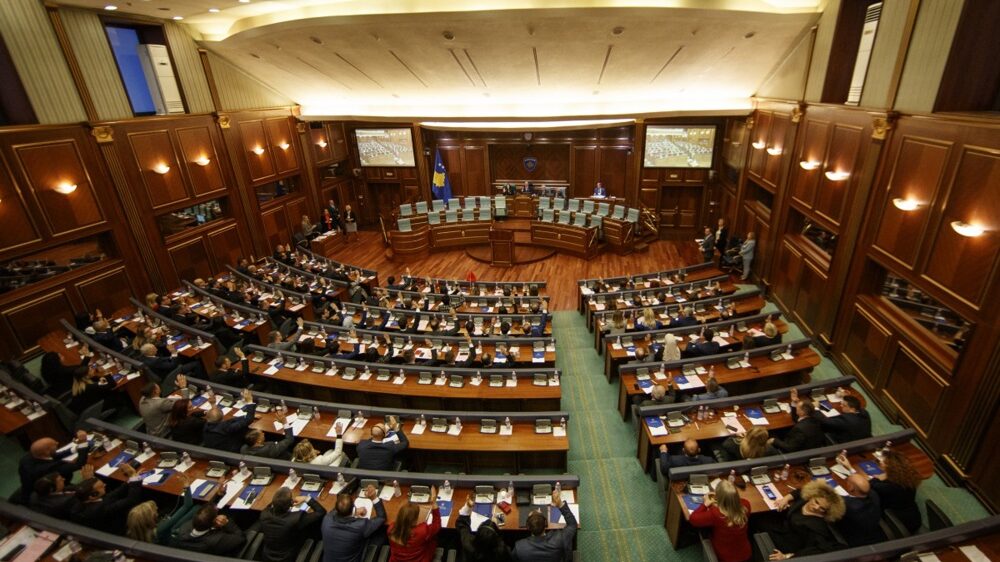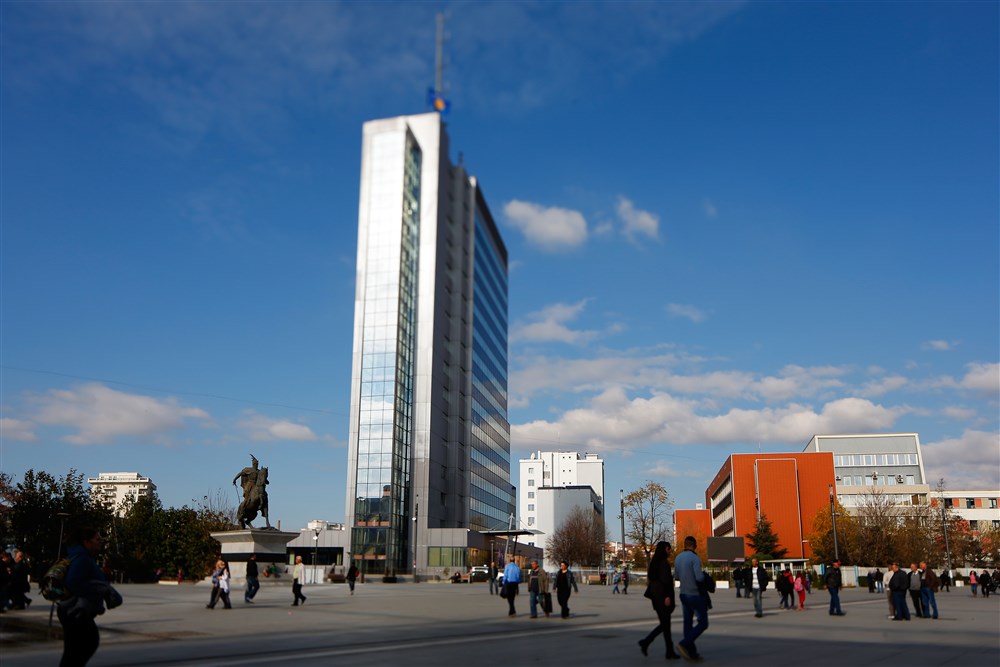Kosovo keeps its contracts with lobbyists secret, raising concerns over a lack of transparency in the way in which taxpayer money is being spent.
Kosovo has spent millions of euros on lobbyists who press its case with would-be recognisers of its independence and international organisations that the country wishes to join.
But lobbyists are never picked via standard public procurement processes; the website of the Public Procurement Regulatory Commission contains no lobbying contract signed by the foreign ministry under the current government or under any previous government.
“Given that the fight against corruption is a continuous priority for national institutions, it is crucial to regulate this field as soon as possible,” Metushi-Krasniqi told BIRN.
Handsomely paid

Infographic: BIRN/Besnik Krivanjeva
One lobbying contract that has reached the public domain, however, was signed in June 2023 with two US-based lobbyists, Avni Mustafa and Aferdita Rakipi, who were hired to provide “strategic advice, advocacy, and communication with the US legislative and executive branches to advance bilateral relations between the US and Kosovo”.
They were to be paid 147,000 euros each per year, according to details contained in a secret decision to classify the contract as secret but which was obtained by BIRN in February this year.
Under US law that requires all foreign lobbyists to register under the Foreign Agents Registration Act, the entire contract was made public in the US.
The contract coincided with fallout between Kosovo and its chief western backers in the US and EU after they criticised the government of Prime Minister Albin Kurti for stoking tensions in a predominantly Serb-populated area of northern Kosovo.
Another BIRN investigation in 2020 revealed that the year before the Ministry of European Integration, led at the time by Dhurata Hoxha, had paid 168,000 euros to a Paris-based company, Majorelle PR & Events, to promoted the idea ‘territorial modification’ – a euphemism for ‘land snap’ or ‘partition’ – could pave the way to ‘normalisation’ of relations between Serbia and its former southern province. Kosovo’s president at the time, Hashim Thaci, had mooted such a solution.
State secrets

Members of the Parliament of the Republic of Kosovo in Pristina, Kosovo. EPA-EFE/VALDRIN XHEMAJ
Under Kosovo law, lobbying expenses fall under the category of public expenditure, just like any other government spending.
The Ministry of European Integration won’t even say how many it has signed since Kurti became prime minister in March 2021.
“Documents related to special expenditures, particularly in lobbying, are classified as confidential because their publication would harm state interests,” the ministry told BIRN.
Kosovo’s Public Procurement Regulatory Commission, PPRC, said it was up to the contracting authority, in this case the ministry, to decide whether such contracts should be made public.
“Which procedure the Contracting Authority, CA, chooses is at its full discretion,” the Commission said.
Article 3 of the Law on Public Procurement gives the contracting authority discretion on contract procedures when dealing with state secrets or matters of state security interests.
Other Balkan states have lobbying laws
Lobbyists hired in the US, however, are required by law to register their activities. How much they are paid is almost made public.
The EU also has a Transparency Register listing organisations, associations, groups and self-employed individuals conducting activities to influence EU policies and decision-making processes.
Metushi-Krasniqi from the Kosovo Democratic Institute said that Kosovo benefits greatly from a lobbying law that would improve transparency, accountability and democratic influence in decision-making processes.
“A lobbying law would require all lobbying activities to be documented and registered,” she said. “This would ensure that the public knows who is lobbying for what and how it impacts public decision-making. This would limit the hidden influence of interest groups and combat corrupt practices that occur due to a lack of legal regulation.”
Among Kosovo’s regional peers, Serbia, North Macedonia and Montenegro already have lobbying laws.
In North Macedonia, for instance, the State Commission for the Prevention of Corruption manages a central registry where lobbyists are required to register under a 2021 law.
One-year contract: 90,000 euros

Kosovo Government Building. Photo: VALDRIN XHEMAJ/EPA
Based on data from the US Foreign Agents Registration Act, besides hiring Mustafaj and Rakipi for just short of 147,000 euros each, Kurti’s government also sealed a short-term contract worth $35,000 with a company called Civica, owned by Ilir Zherka.
Ilir Zherka is an activist for human and civil rights. He is Executive Director of Alliance for International Exchange.
Zherka has served as the Executive Director of three other organizations, where he has worked on a bipartisan basis to help end ethnic cleansing in Kosovo, advance DC representation in Congress.
According to the online data, Zherka worked with Congressman George Miller, serving as an adviser in four presidential campaigns and as a political appointee in the Clinton administration.
Another consulting contract was awarded to Gani Jakupi, a private individual, for lobbying in the field of cultural diplomacy between June 2023 and June this year. The 12-month contract was worth 90,000 euros before tax, to be paid in 12 monthly instalments.
Gani Jakupi is a writer, illustrator and founder of the first international graphic novel festival in Kosovo, ‘Granfest’.
BIRN obtained the contract with Jakupi at the end of last year following a legal battle with the foreign ministry during which BIRN appealed to Kosovo’s Information and Privacy Agency.
When Jakupi’s contract expired, BIRN also requested access to the final report on his diplomatic efforts to raise Kosovo’s profile abroad. The foreign ministry again refused, saying Jakupi’s work included communicating with officials and institutional, cultural, and media entities in various countries, including some that do not recognise Kosovo and with organisations of which Kosovo is not yet a member.
“These meetings were arranged with an obligation to maintain confidentiality concerning the form and content of the discussions,” the ministry said. Disclosure of the report could jeopardise Kosovo’s image abroad and its further international integration, it said.





